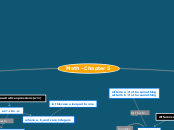Math - Chapter 5
Factoring
Monomial common factors
Monomial = 1 term
factor out a monomial out of a set of terms
6x² - 14x + 8
the biggest number that can
divide all of these terms is 2
divide everything by 2
6x² - 14x + 8
___________
2
2(3x² - 7x + 4)
you cannot change the equation
that's why the 2 is put in the
front of the brackets
if you ere to expand it you would
end up with the same equation as before
nothing was changed
only simplified
no biggest common variable
2 is the only thing common
among all 3 terms
Binomial common factors
Binomial = 2 terms
A binomial factor that is shared by all the terms of a polynomial
common binomial among a polynomial
7(x-3) - 2x (x-3)
(x-3) is the greatest common factor
(x-3) [ 7(x-3) 2x (x-3)]
______ - ______
(x-3) (x-3)
divide everything by (x-3)
put it outside the bracket
∴ equation not changed
(x-3)(7 - 2x)
When (x-3) is removed from the terms
(7-2x)
Group common factors
4 terms separated into 2 groups
find common factor for both groups
produces a binomial common factor
2wx + 10w +7x + 35
l_________l l______l
group one Group two
Group one ->
2 and w = greatest common factor
2w(x+5)
2w(x+5) + 7(x+5)
binomial common factor
(x+5)(2w+7)
refer to binomial common factor
Group 2 ->
7 is the greatest common factor
7(x+5)
Factoring Quadratic expressions (a≠1)
ax² + bx + c
Find 2 integers that when multiplied together is equal to a X c
Those same two integers have
to add up to b
a(x+r)(x+s)
3x² + 8x +4
__ x __ = 12 ( a X c)
__ + __ = 8 (b)
Those two integers are
2 and 6
2 x 6 = 12 (a X c)
2 + 6 = 8 (b)
Break down b into 2x and 6x
and add that to the equation
3x² + 2x + 6x +4
Group factor
refer to group factoring
x(3x+2) + 2(3x+2)
(3x+2)(x+2)
Where a, b, c are integers
Factoring Quadratic expressions (a=1)
ax² + bx + c
where a, b, and c are integers
in this case a is equal to one
find 2 integers that when
multiplied is equal to c
those 2 integers have to also
equal to b when added together
a(x+r)(x+s)
ax² + 5x +6
always see if you can common
factor something out first
in this case no
__ x __ = 6 (c)
__ + __ = 5 (b)
Those two integers are 2 and 3
2 x 3 = 6 (c)
2 + 3 = 5 (b)
r = 2
s = 3
can be switched around
r ans s can equal to
which ever integer
(x+2)(x+3)
Expanding
difference of squares
(a+b)(a-b)
a² - b²
all term a = to the same thing
all term b = to the same thing
(4x+5y)(4x-5y)
simplifies to
(4x)² - (5y)²
16x² - 25y²
part of factoring as well
Multiply binomials
2 factors of 2 terms being
multiplied to each other
(x-4)(x-5)
methods to do this
its like applying the
distributive property twice
multiply each term in the first
factor by each in the second
FOIL
F - First
O - Outer
I - Inner
L - Last
distributive property
multiply a single term
by 2 or more terms
used to expand
equations/expressions
squaring binomials
(a+b)²
Short form
can be solved in 2 ways
using Formula
a²+2ab+b²
(a+b)²
a² - 2ab+b²
(a-b)²
Expanding
(a+b)²
(a+b)(a+b)
FOIL it
a²+ab+ab+b²
a²+2ab+b²
Subtopic

The -2 is multiplied to
everything in the bracket
Expanded
done so to get rid of the -2
The biggest number that is common
among these terms is 4
both can be divided by 4
divide everything by 4 and add brackets around the divided terms
write the 4 in front of the brackets
simplified
used to simplify
equations/expressions
done so by finding the greatest common
factor in an expression/equation
2x -> a
3 -> b
(2x)² + 2(2x)(3) + (3)²
(2x+3)(2x+3)
4x² + 6x + 6x + 9
4x² + 12x + 9
Floating topic
(3x+4)(8x+5)
24x² + 15x + 32x + 20
24x² + 47x + 20
Perfect square trinomials
Square root of a and the square root of c
all multiplied by 2 is equal to b
4x² + 12x + 9
Square root of 4 -> 2
square root of 9 is -> 3
2(2)(3)
= 12 = b
∴ This is a perfect square trinomial
(2x+3)²
